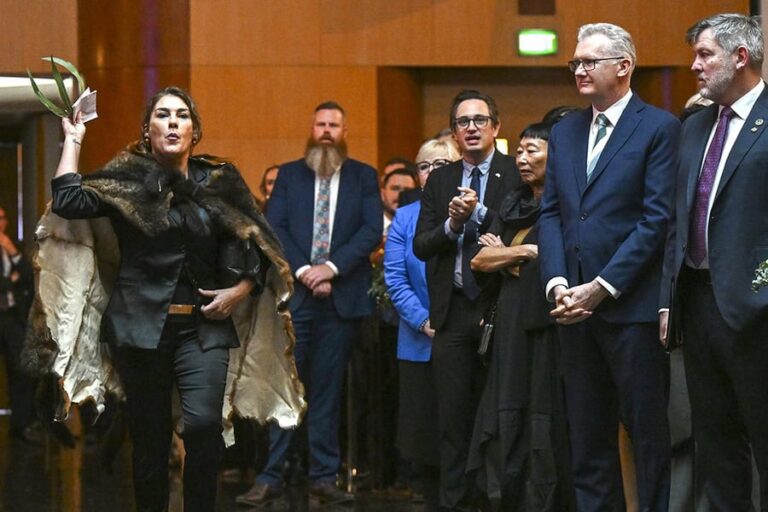During a parliamentary reception in Canberra on Monday, Indigenous Senator Lidia Thorpe interrupted King Charles III’s speech, loudly challenging the British monarch over what she called the “genocide” of Indigenous Australians. The outburst, which took place just moments after Charles addressed the gathering, reignited discussions about Australia’s colonial past and the nation’s debate over becoming a republic.
Thorpe, a well-known advocate for Indigenous rights, accused the British Crown of taking land and lives from Australia’s Indigenous communities. “Give us our land back! Give us what you stole from us!” she shouted, as security personnel moved in to escort her out. She continued, “You committed genocide against our people. This is not your land; you are not my king.”
The senator’s protest overshadowed what was otherwise a cordial reception, highlighting the complex and fraught history between the Crown and Australia’s Indigenous peoples.
Thorpe’s comments during the reception echoed a long-standing demand for justice and recognition of historical wrongs. She has been vocal about the need for a treaty between Australia’s government and its Indigenous peoples — an issue that has yet to see a resolution. “Give us a treaty. We want a treaty,” she demanded as she was led out of the hall.
The timing of Thorpe’s remarks was significant. Charles and his wife, Queen Camilla, were in the midst of their first official visit to Australia since he became king in 2022. The trip was also Charles’ first major tour abroad following his cancer diagnosis earlier this year.
Prime Minister Anthony Albanese, who is an advocate for Australia transitioning to a republic, offered a diplomatic welcome to the royal couple while subtly addressing the issue of Australia’s constitutional ties with the British monarchy. “You have shown great respect for Australians, even during times when we have debated the future of our constitutional arrangements,” Albanese said, hinting that “nothing stands still.”
Senator Thorpe’s protest was not an isolated event but part of a broader movement seeking reparations and formal recognition of Indigenous rights. Her remarks on Monday were consistent with her history of activism. Last year, she blocked a police float at Sydney’s Gay and Lesbian Mardi Gras by lying down in front of it, and she has often used public platforms to challenge policies and figures she views as oppressive to Indigenous communities.
While Thorpe’s actions have often drawn criticism, especially from those who see them as disrespectful, they have also brought attention to issues of colonialism and systemic racism that persist in Australia. “I’m going to be here every day because there’s been no justice,” Thorpe said in previous interviews, underscoring her commitment to her cause.
King Charles’ visit also reopened debates about Australia’s status as a constitutional monarchy. Although Australians voted to retain the monarchy in a 1999 referendum, recent discussions have suggested a shift in public opinion. Albanese’s Labor Party has long advocated for a republic with an Australian head of state, and the party’s re-election next year could see renewed efforts to revisit the issue.
In December 2023, the Australian Republic Movement (ARM) wrote to Buckingham Palace requesting a meeting with King Charles during his trip to Australia, hoping to gain his support for their cause. The palace declined the request, stating that the matter was for the Australian public to decide. “Whether Australia becomes a republic is … a matter for the Australian public to decide,” the statement from Buckingham Palace read.
As King Charles III’s visit continues, the echoes of Lidia Thorpe’s impassioned demands for justice and recognition serve as a stark reminder of unresolved issues in Australia’s history. While the monarch remains a symbol of tradition and continuity, voices like Thorpe’s emphasize the urgent need for change. The future of Australia’s relationship with the British Crown remains uncertain, but discussions around sovereignty, identity, and reconciliation will not be going away anytime soon.
